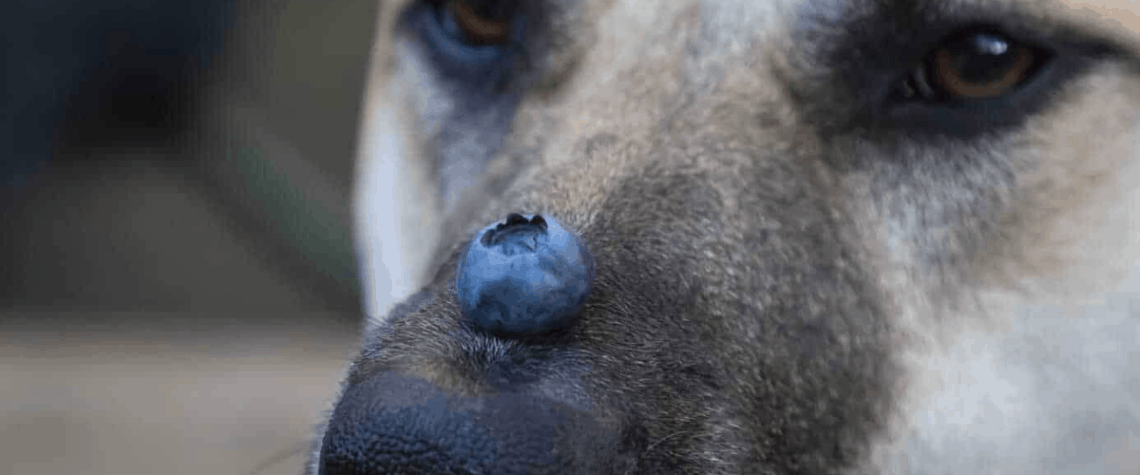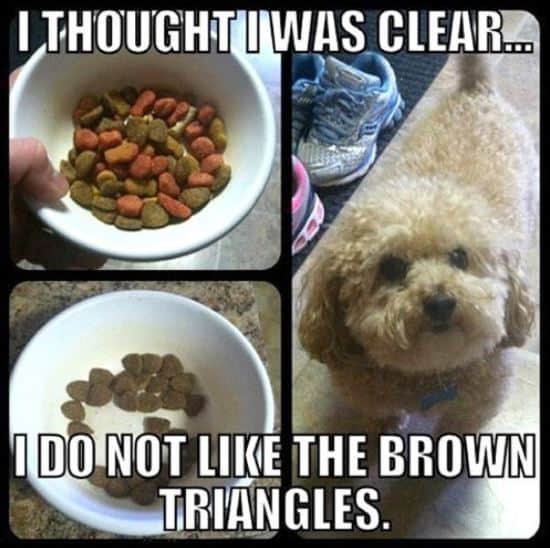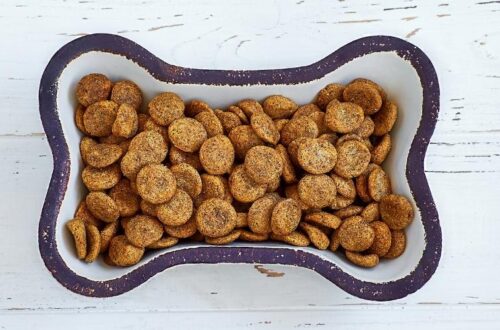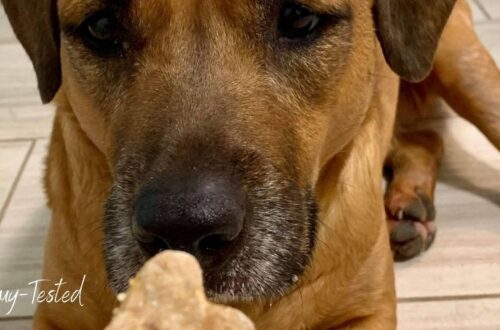
What Fruits and Vegetables Can Dogs Eat?
Not only can dogs eat fruits and vegetables… they should eat fruits and vegetables! Here’s why they they are an important part of your dog’s diet, and what they can and can’t eat. (Plus, added bonus, we touch on the grain-free controversy while we’re at it.)
What are the Benefits of Fruit and Vegetables for Dogs?
Dogs are omnivores, like humans. They protein, fiber, carbs, vitamins and minerals to have a healthy coat, boost their immune system and have strong teeth and bones.
For example,
- Sliced apples are an excellent source of vitamins A and C, which keep a dog’s skin and coat healthy.
- Carrots, green beans, sweet potatoes, and bananas are packed with important vitamins, along with potassium, which is good for a dog’s muscles, nerves, heart and kidneys.
- Fiber keeps everything moving in a “solid” healthy manner, making poop patrol easier.
Plus, new foods expand your dog’s world. After all, wouldn’t you be bored if you ate the same brown pellets or triangles every day?

Do Commercial Dog Foods Have Vegetables?
Most commercial dog foods are made with vegetables and fruits along with meat and grains. These products are also made to include all the nutrients a dog needs to be healthy, whether from a food source, or through supplements.
However, it’s important to know that these ingredients can also be the source of your dog’s allergy issues.
This Dog Mom was surprised (after allergy testing) to learn that the high quality food she was feeding included three items that her dog was allergic to: beet pulp, tomato pulp and potatoes. If your dog has sensitive skin, you will want to check the ingredients for these items, all of which are low nutrition fillers.
What Fruits and Vegetables Can I Feed My Dog?
Here’s a list of some of the fruits and vegetables you can feed your dog.
Leafy Greens
- Stick to those items you would consume — lettuce, spinach, chard, cabbage and kale are all okay for dogs. They are a great source of vitamins, calcium, iron and potassium.
Root Vegetables
- Root vegetables like carrots, sweet potatoes and parsnips are safe to feed your dog. These vegetables are starchy and high in sugar, which means you do want to limit the amount you give to your dog.
Squash
- Squash of all varieties are safe for dogs to eat, including summer squash, zucchini, pumpkin and butternut squash. Bonus: pumpkin and butternut squash can help make your dog’s poop more solid. Just be sure to remove the skin and seeds from these more fibrous squash choices.
Green Beans
- The biggie of veggies for your dog, and the most widely fed. Easy to digest, and (some) dogs like them. Canned, fresh or frozen beans can be used. (Note: despite their name, green beans are not actually classified as beans, and therefore don’t warrant the limitations recommended for true legumes.)
Fruit Salad
- Apples, bananas, pears, pineapple, watermelon, canteloupe and oranges are all healthy for dogs. Just be sure to remove seeds, cores, stems, and in some cases, the peel/rind.
Berries
- Think of a wild dog foraging in the scrub for food. Now think berries — cranberries, blueberries, blackberries, strawberries, raspberries. All are healthy for your dog to eat! (And very healthy for humans too!)
Broccoli, Brussels Sprouts, Cauliflower, and Cucumber
- All of these veggies are safe for your dog to munch on but, like other vegetables, keep it to small quantities – especially if your dog isn’t used to eating these types of foods. Chop these foods into manageable pieces for your dog. Be aware that broccoli and cauliflower can produce a gaseous side-affect!
Getting Veggies & Fruit into Your Dog’s Diet
Here are some tips from the Whole Dog Journal, for ways to incorporate more fruit and veggies into your dog’s diet.
- Stock up on frozen vegetables when they are on sale. Store brand is fine.
- For a summer treat add vegetables to a 1:1 mixture of chicken broth and water in an ice tray.
- Dogs are naturally curious toward what you are doing in the kitchen. They can be your “disposal” for larger than ideal green beans and the ends of cucumber.
Dogs can also eat a number of other human foods. K9ofMine.com has an impressive list of human foods that are good for your dog.
What Vegetables and Fruits are Bad for Dogs?
In any article on what’s good for dogs, we also want to cover what’s bad for dogs:
- Milk and milk products (yogurt, cheese) are not toxic, but if consumed in large quantities, can cause stomach upset and diarhea.
- Grapes, raisins, and currants are toxic to dogs and can cause kidney failure in some.
- Onions, garlic, and chives can be harmful in large amounts. They can cause blood problems for dogs, as well as diarrhea, stomach pain, and nausea, if your dog eats a lot of them. The safest thing is to avoid them altogether
- Avocado is a question mark. The AKC says no, that avocados have persin, which can be toxic. However, other resources say that ripened avocado contains very low levels of persin. Whatever you do, just make sure the skin and the pit are not left in an tempting area (i.e. trash can) where your dog can get at them.
- Chocolate (especially dark chocolate) can be toxic to dogs if consumed in large doses.
With any of these foods, if you have a doubt or concern about something your dog has ingested, call your veterinarian immediately, or call the ASPCA Animal Poison Control at 888-426-4435
Are Grain-Free Foods Bad for Dogs?
We can’t talk about food without addressing the recent elephant in the room.
Grain free foods are those that do not include corn, wheat and barley. The theory on grain-free is similar to the human paleo diet — high protein, and a return to “ancestral foods” of the canine diet.
But, you’ve probably seen the firestorm of press around “THE LIST” of grain-free foods that are part of an FDA study on the potential connection between diet and cases of canine heart disease. This study first came out in July 2018. The update in June 2019 included a list of foods that impacted dogs had eaten.
Here’s what it says, in part:
Food and Drug Administration is alerting pet owners and veterinary professionals about reports of canine dilated cardiomyopathy (DCM) in dogs eating certain pet foods containing peas, lentils, other legume seeds, or potatoes as main ingredients. These reports are unusual because DCM is occurring in breeds not typically genetically prone to the disease. The FDA’s Center for Veterinary Medicine and the Veterinary Laboratory Investigation and Response Network, a collaboration of government and veterinary diagnostic laboratories, are investigating this potential association.
Canine DCM is a disease of a dog’s heart muscle and results in an enlarged heart. As the heart and its chambers become dilated, it becomes harder for the heart to pump, and heart valves may leak, leading to a buildup of fluids in the chest and abdomen. DCM often results in congestive heart failure. Heart function may improve in cases that are not linked to genetics with appropriate veterinary treatment and dietary modification, if caught early.
The underlying cause of DCM is not truly known, but is thought to have a genetic component. Breeds that are typically more frequently affected by DCM include large and giant breed dogs, such as Great Danes, Boxers, Newfoundlands, Irish Wolfhounds, Saint Bernards and Doberman Pinschers. It is less common in small and medium breed dogs, except American and English Cocker Spaniels. However, the cases that have been reported to the FDA have included Golden and Labrador Retrievers, Whippets, a Shih Tzu, a Bulldog and Miniature Schnauzers, as well as mixed breeds.
Diets in cases reported to the FDA frequently list potatoes or multiple legumes such as peas, lentils, other “pulses” (seeds of legumes), and their protein, starch and fiber derivatives early in the ingredient list, indicating that they are main ingredients. Early reports from the veterinary cardiology community indicate that the dogs consistently ate these foods as their primary source of nutrition for time periods ranging from months to years.
High levels of legumes or potatoes appear to be more common in diets labeled as “grain-free,” but it is not yet known how these ingredients are linked to cases of DCM.
In other words:
- We’re investigating reports of DCM in breeds that don’t usually get DCM
- The common thread in these cases is that the impacted dogs ate diets high in legumes and potatoes.
The list of foods that these dogs ate reads like a who’s who of high end animal nutrition, including Fromm’s, Acana, Taste of the Wild, Blue Buffalo, Natures’ Domain and more. However, correlation is not causation. That’s why the FDA clearly states, “it is not yet known how these ingredients are linked to cases of DCM.”
What we do know is this (from Patsy’s Pet Market):
There are less than .05% to 1% of the 77 million dogs in this country that have DCM, and less than .1% are speculated to have DCM related to diet. The recent research states 119 dogs and 5 cats died out of the 515 dogs and 9 cats identified as DCM while feeding a grain free or a grain food. (Note: reports are from 2014 to 2019)
The FDA is stating there is no scientific evidence that grain free foods could potentially lead to a deficiency of the amino acid, TAURINE. There is further research that needs to be done when foods that do not have high meat content (or none at all) and use peas and potato as the protein source.
(Note: Taurine is an amino acid commonly found protein. It’s often included as an additional supplement in grain free foods, to combat taurine deficiency, which is thought to be a potential cause of DCM. Some grain free diets use high levels of peas and lentils as a protein source, rather than high quality meats.)
In a summary of the FDA’s July 2019 update on diet and canine heart disease on the AKC’s website:
They (FDA) examined labels of dog food products reported in DCM cases to determine whether the foods were “grain-free” (defined as no corn, soy, wheat, rice, barley or other grains), and whether the foods contained peas, lentils, chickpeas, beans, or potatoes (including sweet potatoes). Their report states that more than 90 percent of foods reported in DCM cases were grain-free, 93 percent of reported foods contained peas and/or lentils, and 42 percent contained potatoes/sweet potatoes.
We are not veterinarians here… but check to see how high up peas and lentils are in the ingredient list of the food you use, and talk to your veterinarian for advice.





2 Comments
Pingback:
Adam
I use carrots and pumpkin as treats – my dog loves it!